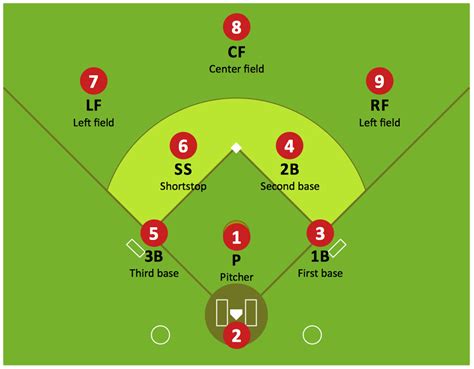Explore the significance of sportsmanship in baseball, key traits in players, its impact on team dynamics, and real-life examples for youth programs.**Sportsmanship in Baseball: Lessons Beyond the Game**
Baseball, often referred to as America’s pastime, is more than just a game; it embodies values that extend well beyond the diamond. At its core, sportsmanship in baseball teaches essential life lessons such as respect, teamwork, and integrity. As players and fans alike witness the spirit of fair play, they understand that the conduct displayed during the game shapes character and community. In this article, we will explore the significance of sportsmanship in baseball, highlight key traits that define good sportsmanship, and examine how these ideals foster healthy team dynamics. We will also delve into youth baseball programs and share inspiring real-life examples that illustrate the profound impact sportsmanship has on players, teams, and society as a whole. Join us as we celebrate the virtues of sportsmanship and its lasting influence both on and off the field.
Understanding The Importance Of Sportsmanship In Baseball
Sportsmanship in baseball goes beyond just the game itself; it embodies the spirit of fairness, respect, and integrity that defines great players and teams. Every baseball encounter is not only a test of physical skills but also a reflection of a player’s character. Upholding the principles of sportsmanship ensures that the game is enjoyable for everyone involved, from players to spectators. Here are several reasons why sportsmanship is vital in baseball:
Prioritizing sportsmanship in baseball not only enhances the game itself but also instills important life values, making it a crucial aspect of the sport. Embracing these principles helps to create a better environment for players and fans alike, reinforcing the rich tradition and community inherent in the game of baseball.
Key Traits Of Good Sportsmanship In Players
Good sportsmanship in baseball is vital not only for individual players but also for the health of their teams and the overall atmosphere of the game. It encompasses several key traits that every player should strive to embody:
| Trait | Description |
|---|---|
| Respect | Players should show respect towards opponents, officials, and the game itself. This includes acknowledging good plays, regardless of which team made them. |
| Integrity | Maintaining honesty during play and adhering to the rules of the game is essential. Players should be accountable for their actions, both on and off the field. |
| Fairness | Good sportsmanship means playing fair, without resorting to cheating or unsportsmanlike conduct. Players should strive to achieve success through hard work and dedication. |
| Teamwork | Collaboration and supporting teammates are crucial. A good sport encourages their teammates and celebrates collective achievements. |
| Humility | Winning gracefully and accepting defeat with dignity are hallmarks of good sportsmanship. Players should understand the importance of both victory and loss as learning experiences. |
Incorporating these traits into daily practice can foster a culture of sportsmanship in baseball that extends beyond the diamond, shaping players into responsible and respectful individuals in all aspects of life.
How Sportsmanship Influences Team Dynamics In Baseball
Sportsmanship in baseball is not just about fair play; it is a catalyst that shapes the overall dynamics of a team. When players demonstrate sportsmanship in baseball, it cultivates a positive environment that fosters collaboration, respect, and trust among teammates.
One of the key influences of sportsmanship on team dynamics is the enhancement of communication. Players who exhibit sportsmanship are more likely to engage in open and honest discussions, which leads to improved understanding and cooperation both on and off the field. This open line of communication can help address conflicts swiftly and fosters a sense of unity within the team.
Moreover, teams characterized by good sportsmanship in baseball commonly exhibit higher morale. When players encourage and support one another, it enhances their confidence and motivation. This positive reinforcement can greatly affect performance, making players more willing to take risks and push their limits during competition.
Another significant aspect is the role of role models in shaping team culture. Players demonstrating exemplary sportsmanship in baseball serve as important examples for younger or less experienced team members, establishing a standard of behavior that everyone strives to emulate. This culture reinforces the importance of integrity and respect towards opponents and officials, further solidifying the team’s cooperative framework.
The influence of sportsmanship extends beyond just playing fair; it impacts the team dynamics in profound ways. By creating a cohesive unit built on trust, communication, and mutual respect, teams are better equipped to overcome challenges and achieve success together.
Teaching Sportsmanship In Youth Baseball Programs
Teaching sportsmanship in baseball goes beyond simply conveying the rules of the game; it’s about instilling values that young players will carry with them both on and off the field. In youth baseball programs, coaches and parents play a crucial role in shaping the attitudes and behaviors of young athletes.
One effective approach is to incorporate discussions about sportsmanship in baseball into practice sessions. Coaches can use real-game scenarios to highlight the importance of respect, teamwork, and integrity. For example, after a game, discussing moments when players exhibited good sportsmanship or where improvements could be made can help reinforce these principles.
Additionally, recognizing and rewarding acts of good sportsmanship in baseball can greatly enhance young players’ understanding of its significance. This might include simple gestures like acknowledging an opponent’s performance or assisting a teammate who is struggling. Such actions should be celebrated, fostering an environment where positive behavior is the norm.
Another key aspect is leading by example. Coaches and mentors should consistently display strong sportsmanship in baseball, showing young players what respectful behavior looks like. Whether it’s maintaining composure after a loss or congratulating the opposing team after a tough game, these actions set a powerful example for children to emulate.
Incorporating educational materials, such as books or videos about the history of sportsmanship in baseball and its role in legendary games, can also be beneficial. By presenting relatable stories of past players who exemplified these values, coaches can help instill a lasting appreciation for good sportsmanship in young athletes.
By emphasizing the importance of sportsmanship in baseball in youth programs, we are preparing players not just for the game but for all aspects of life, helping them develop into respectful, responsible adults who understand the true spirit of competition.
Real-Life Examples Of Sportsmanship In Baseball
Sportsmanship in baseball serves as a guiding principle that shapes the attitudes and behaviors of players both on and off the field. Numerous instances throughout baseball history exemplify how players can demonstrate integrity, respect, and fairness. Here are some notable examples:
These real-life instances illustrate that sportsmanship in baseball transcends mere winning or losing; it emphasizes the values of respect, empathy, and integrity, which ultimately enrich the experience for players and fans alike.
The Lasting Impact Of Sportsmanship In Baseball And Life
Sportsmanship in baseball extends well beyond the confines of the diamond. The lessons learned from exhibiting good sportsmanship can shape players’ character and influence their behavior in various aspects of life. Here are some of the enduring impacts:
| Area of Impact | Description |
|---|---|
| Character Development | Players who embrace sportsmanship in baseball develop traits such as integrity, respect, and accountability. These qualities are crucial in both personal and professional relationships. |
| Conflict Resolution | Participating in fair play teaches athletes how to handle disputes amicably, laying the groundwork for effective communication and negotiation skills. |
| Community Engagement | Players who demonstrate good sportsmanship often become role models in their communities, encouraging younger generations to participate positively in sports and society. |
| Life Skills | Lessons learned through sportsmanship in baseball such as teamwork, perseverance, and leadership are beneficial in both academic and workplace settings. |
The enduring influence of sportsmanship in baseball can foster a sense of belonging and responsibility, helping individuals to navigate life’s challenges with grace and respect. Whether it’s on the field or in daily life, the principles of good sportsmanship serve as a foundation for success and fulfillment.
Frequently Asked Questions
What is the definition of sportsmanship in baseball?
Sportsmanship in baseball refers to the ethical and polite behavior of players, coaches, and fans, emphasizing fairness, respect, and integrity during the game.
How does sportsmanship influence youth baseball players?
Sportsmanship plays a critical role in youth baseball by teaching young players the importance of teamwork, respect for opponents, and handling both victory and defeat gracefully.
Can you provide an example of good sportsmanship in baseball?
An example of good sportsmanship in baseball is when a player helps an injured opponent off the field or congratulates the opposing team after a hard-fought game.
What are some negative effects of poor sportsmanship in baseball?
Poor sportsmanship can lead to increased tension, conflicts between players and fans, and a negative atmosphere, ultimately detracting from the enjoyment of the game and the development of young athletes.
How can coaches promote sportsmanship among their players?
Coaches can promote sportsmanship by modeling respectful behavior, emphasizing the importance of fair play in their coaching, and discussing the values of respect and integrity during practices and games.
What lessons from sportsmanship can be applied to everyday life?
Lessons from sportsmanship, such as respect for others, accountability, and resilience in the face of challenges, can be applied to everyday life situations, enhancing personal relationships and professional conduct.
Why is sportsmanship especially important in competitive environments?
Sportsmanship is vital in competitive environments because it fosters a culture of respect, encourages healthy competition, and helps maintain the integrity of the game, ensuring that all participants feel valued and respected.









